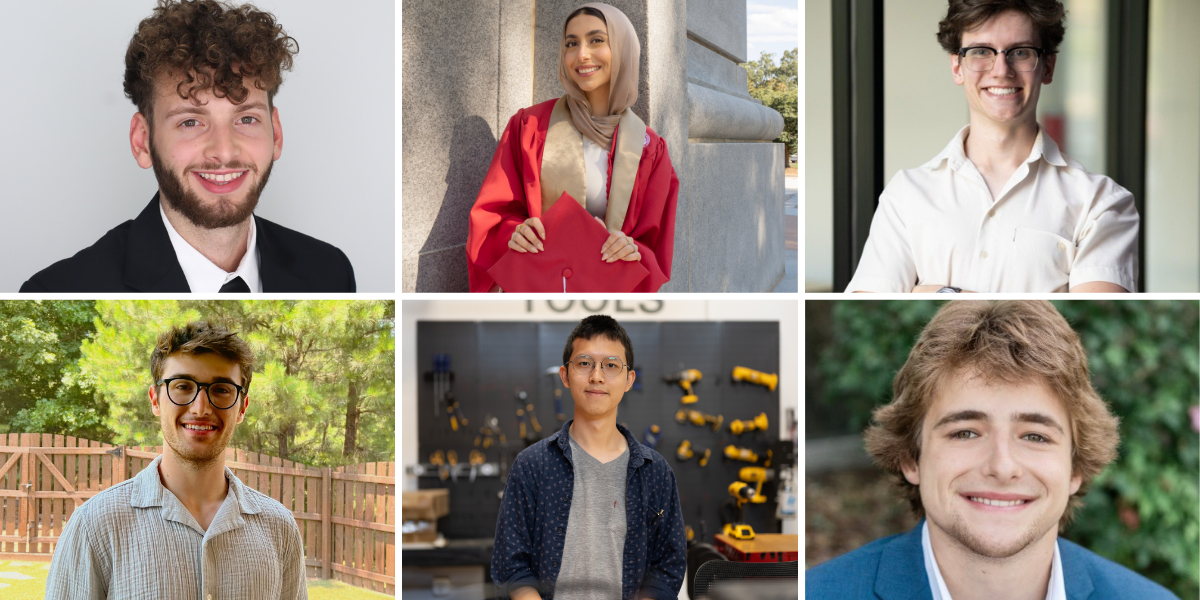Poole College, Engineering Collaboration Could Benefit Students Across NC State
A simulation tool developed by computer science students for Poole College lecturer Jenn Woodhull-Smith could be adapted throughout the university to enrich teaching and learning.

The simulation that NC State computer science students are developing for Poole College lecturer Jenn Woodhull-Smith is creative, engaging and innovative.
So is the real-world collaboration between Poole and the College of Engineering. And it will produce a computer game that faculty across the university may be able to adapt to enrich students’ learning.
The team of seniors is developing an open-source mini-simulation tool. It has a cast of characters and dialogue that relate to the five modules in Woodhull-Smith’s Introduction to Entrepreneurship course. Poole students who take the course also will answer questions and receive feedback in the simulations.
“Students seem to like open-source materials, and they’re free to them, so it will be an additional engagement piece with the course material,” says Woodhull-Smith, who also redesigned the course textbook to make it open source.
The Poole simulation tool is the team’s semester-long capstone project, through NC State’s Computer Science Senior Design Center. The students, and their computer science peers, presented posters and offered demonstrations of their projects at the annual Poster & Pies event Dec. 4 at James B. Hunt Jr. Library.
Collaboration Across Colleges
“I want to show that faculty can work across colleges … How can we partner together to make all students successful, especially with something like an open-source platform?” Woodhull-Smith says. “Ideally any faculty can use this platform to develop mini-simulations for their course.”
Developing the Poole simulation tool is a change for the computer science students, advised by computer science professor Alexander Card. Instead of creating a complex system, they’re simplifying features of Godot — an existing open-source game engine — to make it accessible to people without a computer programming or software background.
“Usually we’re the ones making the game. Now we’re making a tool for someone else to make that game, an interactive simulation,” says Drew Moore, one of five students involved. “Doing that in a way that’s more intuitive and user-friendly has been a really cool challenge. Anyone will be able to pick up our piece of software and make a text-interactive game with it.”
“I want to show that faculty can work across colleges … How can we partner together to make all students successful, especially with something like an open-source platform?”
The students have made Photoshop design mockups and discussed the project weekly with Woodhull-Smith and David Tully, a librarian at NC State University Libraries’ Open Knowledge Center.
The team’s well-organized, on-task meetings have made the collaboration between the colleges easier.
“They’re good at communicating to nontechnical people. That’s what their strength really has been. They’ve been able to show us visually where they’re at in the process,” Woodhull-Smith says.
“We want to make sure they’re here with us every step of the way while we’re making this product,” says Moore who, with his teammates, is pursuing a game development concentration. “Being able to communicate our current progress and designs for our project … in a way that people outside our field of study can understand is an important skill for our career.”
Cross-college projects could benefit students at Poole and in other NC State disciplines, with the potential to enrich their skills in communication and other areas. And those collaborations can offer the types of high-impact, hands-on experiences that students need for career success.
Once the new simulation tool for Poole is finished, Woodhull-Smith says, “It will increase engagement in classes and give students a real-world scenario that aligns with the course content.”


